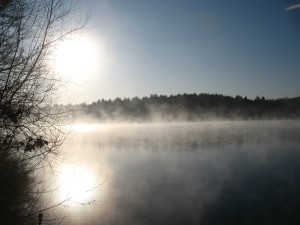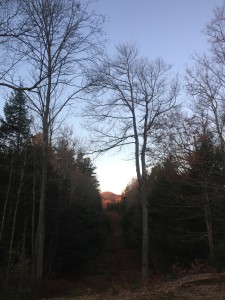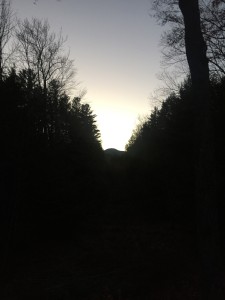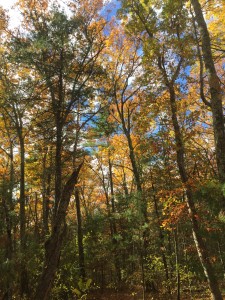In this season of disturbed day and night, I’ve found necessary reading, stories whose thin lines keep reaching toward the world I want to live in, the one I do, even as the news and those who make it try to wipe that world away. The stories are the poems of Kate Barnes, and I have come to them through recommendation from the Gulf of Maine, our local bookstore, itself a kind of kin to the fish that keep swimming upstream to spawn. “Try this,” the owner, a poet himself, said one day, and handed over Crossing the Field. I looked at its handsome woodcut cover, weighed its thinness, and thought, I might even finish this.
For some weeks it sat where most new books do – on my desk in a stratigraphy of enthusiasms. One recent morning, as I sought my coffee-reading to prepare my mind for the day’s words, I saw its blue cover peeking out of the pile, and I unearthed it, carried it to table. I noted, as I always do, its birthdate – 1992 – and turned to page one:
Coming Back
Coming back to my own countryside, I find
the farm again. It is night. Under this wallpaper
of willow leaves and birds, I know there is
an old one with loops of small roses…
No pyrotechnics; rather, a quiet insistence on what return allows, how knowing is layered, and that we live there too, below its surface. Barnes, the daughter of poet Elizabeth Coatsworth and writer Henry Beston, isn’t after easy narratives in her poems; she is 60 when they are published and worn by life’s abrasions, not the least of which is her father, who, fittingly, it seems, renamed himself Beston, by the stone, when made fun of for being “a mick.” But reading her poems is akin to coming on a clearest stream in woods you thought you knew, and then, looking up and seeing with washed vision.
All of this is prelude to a proposal: recent poems I’ve read have been lit – in this corner or that – by fireflies. Yes, they are out of season, but winking light, easily construed as hope, is not. So here, in a spirit of rising light that Kate Barnes and Henry Thoreau might approve, is my proposal:
On January 20th, 2017, when we pass into a new government that I see aligned with darkness, let’s turn off all the lights but one in all of our houses and workspaces. A Day without Light (but one) would recognize and protest a president who seems without spirit and compassion, and it would leave burning resolve and hope to see and then work through this period to a different day. It would be quiet, real, and yes, if enough of us did it, effective.
I don’t know Barnes as well as I know Thoreau, but I think each, both, would nod, yes, and go about that day as a single light.
Added note: I don’t do this, but I’d like to see if this seed-idea can grow, so please share widely if you too would like to see that. Each one of us can be that single light too.
“There is more day to dawn.” Thoreau, Walden




